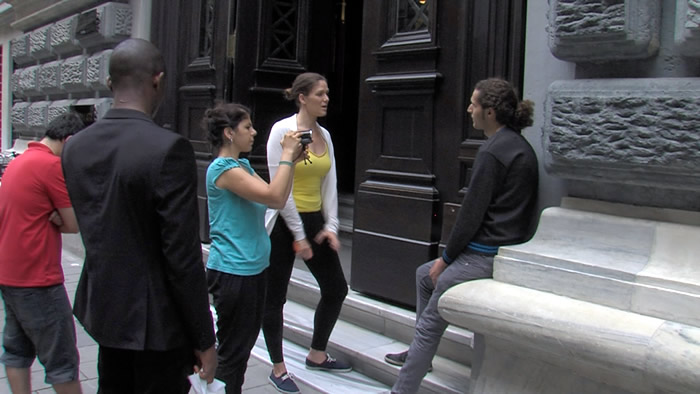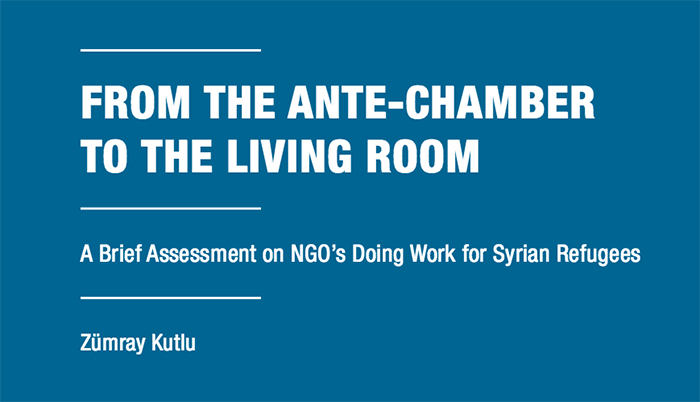Ante-Chamber to the Living Room
A Brief Assessment on NGO’s Doing Work for Syrian Refugees – A Report Review
Zümray Kutlu recently published the report From the Ante-Chamber to the Living Room. A Brief Assessment on NGO’s Doing Work for Syrian Refugees – a work piece, which is a joint project of the Open Society Foundation and Anadolu Kültür. As the title already makes clear, the paper gives a modest overview on the current state of Syrian refugee work done by NGOs in Turkey; more preciously the focus within this work is set on Syrian refugee work done outside of refugee camps. The figures – also mentioned in the reports’ starting chapter – underline, that the main emphases is set accordingly to the current state of situation: More than 2 million displaced people from Syria are in Turkey at the moment – some of them registered, some of them not. However, just an estimated number of more than 250.000 Syrian refugees are living in one of those camps; a fractional amount of the whole number of Syrian people in Turkey.
 Syrian kids (guests?) at the Istanbul bus terminal trying to leave Turkey, September 2015
Syrian kids (guests?) at the Istanbul bus terminal trying to leave Turkey, September 2015
One step further, by looking at the title, the word brief can be underlined because that’s indeed the case: The report runs to 34 pages, including an introduction, an appendix including among others a list of interview partners as well as other sources. So indeed just a few pages left to talk about a topic with a scope like it has in this case. But as it is mentioned within the introduction, the report aims to ‘’provide a modest survey’’ – so far, so good. Indeed, by reading the paper the reader can get an idea about the current state of the Syrian refugees in Turkey and about the work that is done for them. Right from the start Kutlu underlines the fact, that in the beginning of the crisis 2011, the Syrians had been labelled as being guests – literally expected to leave sooner or later. But lots of years passed by; in Syria things went even worse instead of turning back to stability and piece. Kutlu draws a bow to this circumstance, pointing towards the fact that there is still a lack of basic rights in the legislation and therefore the situation necessitates the NGO’s work.
 Video Workshop Searching Traces in Istanbul, 2015
Video Workshop Searching Traces in Istanbul, 2015
Based on that appropriate observation within the introduction, the following pages are structured into four sections – not including introduction and concluding part: At first the legal status of Syrian refugees in Turkey is observed, following a general survey on nowadays’ situation of refugees possibilities to get access to basic services such as health care and education. Both parts offer a basic knowledge for the following part – the heart of the report: This section is divided into two parts and firstly Kutlu names the main active NGOs that conduct work with Syrian refugees. In consequence of having NGOs with different areas of expertise as well as different needs of Syrian refugees, the NGOs had been classified under different headings. According to this they are mentioned in every thematic field, which leads to multiple mentions not clearing up the function of the NGO in particular but anyway the approach makes sense, as the reports’ aim is to offer a general overview on the scope of work done for Syrian refugees in Turkey.
 Private language class by Bassel, Istanbul
Private language class by Bassel, Istanbul
All in all the main part gives a good overview and mentions the main players in this work field – but eying this part of the report more deeply, the output can also engender criticism. Spelling errors can be found like for instance Goethe-Institut, being misspelled as ‘’Goethe Institute’’ or the project Searching Traces being wrongly listed as “In Search of Traces”. Furthermore associations are not mentioned like Ad.dar, a community center for Syrian and Palestinian-Syrian Refugees in Istanbul. Ad.dar is active for about two years and belongs to those supportive powers, who helped to give Syrian children excess to school education. With reference to those mistakes, maybe the source of error is partly the chosen method of the fieldwork or more precisely – the strict focus on nothing but mainly one method: Interviews. Web sites have just been consulted in case NGOs couldn’t be interviewed. But mistakes like misspelling could have been avoided in 2 seconds by checking information in the internet. Also there are informations not given, like for instance Bahçeşehir University being listed without mentioning that there are plans in discussion to open a university for Syrian refugees. Of course internet sources are in academic surroundings still under bad record. Partly reasonable, referring to the case that source holders can’t be proved always. But main presenting pages of NGOs should be a trustful source to get access to information about them. Anyway there are critical points to mention, it is out of question that reports like this one are necessary and that the report’s aim is more or less achieved.
 Turkish ‘Gastarbeiter’ in the 70’s in Germany
Turkish ‘Gastarbeiter’ in the 70’s in Germany
Finally coming to the reports’ heading title From the Ante-Chamber to the Living Room. Kutlu refers in her concluding part again to the point mentioned before in the introduction: 4 years ago, Turkey expected guests to come but instead of going back after an assessable time, they stayed – until nowadays. Kutlu hits the nail on the head by saying that the current situation makes it necessary to change the governmental and public opinion about refugees and their status. In this context Kutlu points out: ‘’The situation requires that the Syrians […] be invited from the proverbial ‘guest room’ of the Middle East to the living room. Durable solutions are needed’’. Concluding her report with these words is a good move as the reports’ output consequently leads to that point, underlining her statements as being substantiated. In addition to that, migration movements in world history showed lots of times equal developments and leaded to similar statements. For example, as Max Frisch put it in 1965, referring to the Turkish gastarbeiter in Germany’s 70’s: “Wir riefen Arbeitskräfte, und es kamen Menschen”/ engl. ‘’We called for a workforce , but we got humans’’. Talking not about foreign workers, but about displaced people who are fleeing from war, Kutlu’s statement should be taken even more serious.


